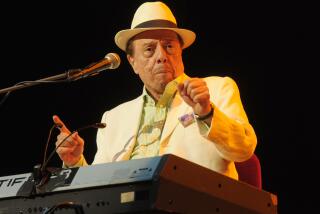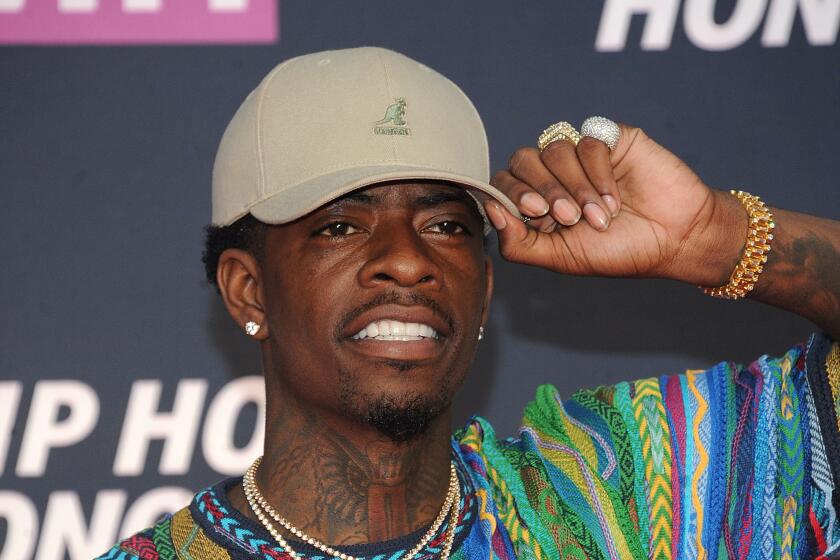Brazil’s hip-hop scene takes the country by storm
SÃO PAULO, Brazil — The MTV Music Awards in Brazil had until recently been the domain of tinny pop and smiling boy bands. But last year, one of the show’s stars took the stage and unexpectedly delivered a set of rap bars through a deadly serious face:
We are the debunkers of Carnaval/
Runaway slaves on digital drums/
The phoenixes of Ash Wednesday/
The Landless Workers Movement of the social networks
Emicida, now one of Brazil’s bigger pop stars, was invoking two of Brazil’s most radical historical movements — the quilombos, or escaped slave settlements, and the workers movement, which organized invasions of the lands of rich farmers — to declare that a new age was allowing Brazil’s long-marginalized rap community to elbow its way into the spotlight.
There was more evidence that this was afoot later that night. Caetano Veloso, the great Tropicalista singer from the 1960s, took the stage with Criolo to sing along to the rapper’s hit, “Love Does Not Exist in São Paulo,” helping to baptize him as one of Brazil’s reigning philosopher-poets. Emicida and Criolo won all the important awards that night and are now among the few Brazilian artists to regularly headline shows abroad.
FOR THE RECORD:
Brazil rap: A headline in the Sept. 23 Arts & Books section over an article about Brazilian rap music misspelled Sao Paulo as Sao Paolo. —
Rap is exploding into the Brazilian consciousness with the same force it did in the U.S. almost 20 years ago. In the gigantic, gray, oppressive and shockingly unequal city of São Paulo, hip-hop culture had been hidden on the outskirts since it started developing from imported American influences in the 1980s.
Now the well-to-do are paying attention to a genre that is unabashedly political, highly poetic and witty. Until recently, the most well-known music coming from rough, urban Brazil was funk from the favelas of Rio de Janeiro, a fast-paced, bass-heavy dance music that in recent years has taken a nihilistic and sexualized path.
With Brazil’s rich lyrical and musical tradition to draw on, rap musicians such as Emicida and Criolo now are turning heads from London to Coachella. Criolo registered 650,000 paid-for downloads in the last year, which is a lot for someone without the major companies behind him, though not as many as the saccharine pop anthem “ Ai Se Eu Te Pego” topping the charts.
Around São Paulo’s urban culture, 1990s California is strongly present visually. Wearing a Raiders hat or L.A. Kings sweat shirt, with their distinctive black and white logos, is a common way to send a clear message that one is a Brazilian rap fan. Or there is Emicida’s trademark cap, also in black in white, which reads: “We are the streets.”
Much of their music celebrates and calls attention to the vast swathes of Brazil that tend to be ignored and left behind, despite the country’s economic boom.
“There’s a change every day. Every day it’s a new age, but it depends what street you’re on,” says Criolo. “And I invite you to walk to the streets. If you go, even to the neighborhoods that appear to be completely forgotten by mankind, you can see an absurd evolution — people maintaining their own dignity, and though they don’t have the material resources, they’re teaching us what it means to be creative, they are doing amazing things.”
Modest goals
This is all a bit new for Kleber Gomes, who is unsure what to do with the newfound attention.
“What I’d like, if I could be permitted, would be a dignified life, three meals a day, and the ability to write and sing what I feel,” says the pensive, soft-spoken rapper in central São Paulo, “without expecting anything from anyone else.”
For the man who began rhyming at 11 years old and was known for most of his career as Criolo Doido, or the Mad Criollo (mixed-race), this humble set of goals was not always within reach. He hails from the poor, sprawling slums of South America’s largest city, and until recently the 36-year-old was sleeping on the couches of friends who believed in him.
He speaks slowly, thinking and rethinking his answers, his face lighting up when he makes a new connection or finds a way to express an idea. “I believe that in every corner of the world there are people living rap and seeing it with different eyes,” says the former school teacher. “If I tried to define what Brazilian rap is, or what rap in the U.S. is, that would be to assassinate one of rap’s most important characteristics, that it doesn’t demand answers.”
Even if he didn’t insist on the fact, the influence of his mother is obvious. She is a kind of intellectual community leader in Grajaú, his slum of 1 million people where she still lives, and organizes a monthly philosophy discussion for residents. Her presence in his life led to his early interest in “letters,” as he says, which found expression in the rhyme-form recently imported from the north.
“We used to be able to buy pirated copies of ‘Yo! MTV Raps’ from the street dealers around the community,” says Emicida at the modest offices of the label he has just launched, Laboratório Fantasma. “But English is a much more monosyllabic language than Portuguese, so you [English speakers] can find different lyrical solutions whereas we have to employ some more clever subterfuges,” he says. “Our poetry is different, but the themes were the same: the ghetto, the margins of society, drugs, violence, ascendance.”
Early on the music took on Brazilian forms. Left-wing rock group Nação Zumbi put spoken words over Brazilian drums, and the widely influential old-school São Paulo group Racionais MC’s poured thousands of radical lines on the plight of the poor, forgotten or imprisoned into a new lyrical mold.
Emicida got into the genre around the time his father was killed in a fight, at age 6, when he withdrew from friends to study and write. “Emicida” is a Portuguese pun on the words “MC” and “Homicide,” and he, like Criolo, does nothing to glamorize the harsh life he emerged from, preferring a sarcastic, aggressive takedown of corrupt upper-class Brazil.
He is younger at 27 and perhaps more media-savvy than Criolo and sticks to the tradition of urban wear, electronic beats and rap, whereas the latter is also prone to singing over a live band wearing the all-white spiritual dress of a samba godfather.
Emicida says the technological revolution has given all kinds of hip-hop culture the attention rich Brazil never would have afforded it — the Internet and pirated music in the streets allowed them to sidestep traditional outlets.
“The people getting their music in the streets know what’s going on, do you know what I mean? That’s where the options are, because they haven’t been in the stores,” he says. “I’ve always considered the media extremely racist.... The Brazilian media is ridiculous.”
U.S. influence
The rap that is now dominating parts of the culture here is thoroughly Brazilian, but the rappers admit the deep influence of U.S. artists, such as KRS-One, Cypress Hill, Notorious B.I.G., Dr. Dre and Snoop Dogg, Wu Tang Klan and the late Tupac Shakur.
On the other hand, Emicida has been critical of the commercialization of many parts of hip-hop in the U.S., rapping “Today rappers just play at being pimps, pimps/ they pop the champagne, celebrating their own extinction.”
For now, the new moment is giving space to emerging talents, such as Rapadura, who mixes rap with traditional rhythms from the distant northeast of Brazil, and Rael da Rima and Rodrigo Ogi, both on Emicida’s label.
Both Emicida and Criolo, who now perform together at times, sing extensively of the brutally obvious urban backdrop to their music — the chaotic, money-driven megalopolis of São Paulo. In Emicida’s video for “So Take It,” starring Criolo, he runs through the dizzying skyscrapers of the city’s financial district, and in “Rua Augusta,” he sings of the poor women who work the streets a few blocks away.
Criolo’s breakthrough “Love Does Not Exist in São Paulo” spoke of
“A mystical labyrinth/ where graffiti screams ... São Paulo is a bouquet/ bouquets are dead flowers/ arranged so pretty/ arranged so pretty just for you.”
The video for the song is simply a slow-moving montage of black paint sprayed on the city’s gray, dilapidated concrete. Most of the graffiti reads simply: “More love, please.” In Portugese, it rhymes: “Mais amor, por favor.”
More to Read
The biggest entertainment stories
Get our big stories about Hollywood, film, television, music, arts, culture and more right in your inbox as soon as they publish.
You may occasionally receive promotional content from the Los Angeles Times.










